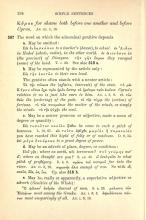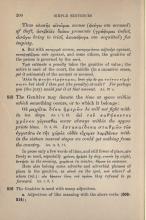505. The Genitive is a blend of two cases, once distinct. These are
1. The Genitive proper (like the Latin genitive),
2. The old Ablative, or From case.
In great part the two sets of uses are fairly distinct; but some uses are puzzling, and must be learned mainly through reading. (In Latin the genitive remained pure, and the ablative was blended with the instrumental and the locative. See § 528.)
506. The Genitive proper may depend on a noun or pronoun directly (Adnominal Genitive). The relation intended is gathered only from the nature of the words and from the context; some combinations occur so often that they are named, but a host of others are too various and elusive to name:[fn]Compare, from Shakespeare, night's predominance, ruin's entrance, in his kingdοm's defense, in his countryʼs wreck, an hour's delay, my heart's core, the Nοrwayʼs king, a summer's cloud, heaven's breath, this night's business, each day's life, lifeʼs feast, my scepterʼs awe; from J. R. Lowell, Lethe's ooze, battle-odes whose lines, the letterʼs sheath, at life's dear peril.[/fn]
a. Ἡ βασιλέως δύναμις
the kingʼs power
(Possessive Genitive)
ἡ ἔφοδος τοῦ στρατεύματος
the approach of the army
(Subjective Genitive)
μηδεμίᾱ σωτηρίᾱς ἐλπίς
no hope of safety
(Objective Genitive)
τριῶν ἡμερῶν ὁδόν
a three days' journey
(Genitive of Measure)
τῶν μῡρίων ἐλπίδων μίᾱ
one hope in ten thousand
(Genitive of the Whole)
b. Πλῆθος ἀνθρώπων
a multitude of men
σῑγῇ φίλων
with silence toward your friends
Eur. Medea 587
ἐν μέσῳ ἡμῶν καὶ βασιλέως
between us and the king
Xen. Anabasis 2.2.3
θεῶν πόλεμος
war from the gods
Xen. Anabasis 2.5.7
ἡ τῶν κρεισσόνων δουλείᾱ
servitude to the stronger
Thucydides 1.8
ἅμαξαι πετρῶν
wagon-loads of stones
Xen. Anabasis 4.7.10
γραφὴ ἀσεβείᾱς
indictment for impiety
ἀδικημάτων ὀργή
anger at wrongdoing
Lysias 12.20
διʼ αἰσχῡ́νην καὶ ἀλλήλων καὶ Κῡ́ρου
for shame both before one another and before Cyrus
Xen. Anabasis 3.1.10
507. The word on which the adnominal genitive depends
a. May be omitted.
Εἰς διδασκάλου
to a teacherʼs (house), to school
ἐν Ἅιδου
in Hadesʼ (abode, realm), in the other world
ἐν Διονῡ́σου
in (the precinct) of Dionysos
τῆς γῆς ἔτεμον
They ravaged (some) of the land.
Thucydides 1.30
See also § 510.a (below).
b. May be represented by the article only.
Eἰς τὴν ἑαυτῶν
to their own land
The genitive often stands with a neuter article.
Tὰ τῆς πόλεως
the (affairs, interests) of the state
τὰ μὲν Κῡ́ρου οὕτως ἔχει πρὸς ἡμᾶς ὥσπερ τὰ ἡμέτερα πρὸς ἐκεῖνον.
Cyrusʼs relation to us is just like ours to him.
Xen. Anabasis 1.3.9
τὰ τῶν θεῶν
the (ordering) of the gods
τὸ τῆς τύχης
the (action) of fortune
τὸ τῶν πνευμάτων
the matter of the winds, the winds
τὰ τῆς ψῡχῆς
the soul
c. May be a neuter pronoun or adjective, made a noun of degree or quantity.
Εἰς τοσοῦτον κακίᾱς ἦλθεν.
He came to such a pitch off baseness.
Lysias 12.67
εἰς τοῦτο ἀφῖχθε μωρίᾱς ἢ παρανοίᾱς.
You have reached this height of folly or of madness.
Demosthenes 9.54
ἐπὶ μέγα δυνάμεως
to a great degree of power
d. May be an adverb of place, degree, or condition.
Ποῦ γῆς;
where on earth (ubi terrarum)?
ποῦ γνώμης ποτʼ εἶ;
Where in thought are you?
Soph. Antigone 42
οἷ ἀσελγείᾱς
to what pitch of profligacy
Demosthenes 4.9
πρόσω τοῦ ποταμοῦ
far into the river
Xen. Anabasis 4.3.28
πημονῆς ἅλις
enough of woe
So with εὖ, κακῶς, ὧδε, ὡs, ἵνα. Cp. also § 518.b (below).
e. May be, really or apparently, a superlative adjective or adverb (Genitive of the Whοle).
Ὦ φἰλτατʼ ἀνδρῶν
dearest of men
Soph. Electra 23
μάλιστα τῶν Ἑλλήνων
most among the Greeks
Xen. Anabasis 1.6.5
ἀφειδέστατα πάντων
most unsparingly of all
Xen. Anabasis 1.9.13
508. A Genitive may be part of the predicate, brought into dependence on a noun or pronoun by means of the verb (Predicate Genitive).
Ἦν οὗτος τῶν ἀμφὶ Mῑ́λητον στρατευομένων.
This man was one of those in military service about Miletos.
Xen. Anabasis 1.2.3
τοιούτων ἐστὲ προγόνων.
Of such ancestors are you.
Xen. Anabasis 3.2.14
ἦν ἐτῶν ὡς τριᾱ́κοντα.
He was about thirty years old.
Xen. Anabasis 2.6.20
οὐ τῶν νῑκώντων ἐστὶ τὰ ὅπλα παραδιδόναι.
Giving up their arms is not the victorsʼ part.
Xen. Anabasis 2.1.9
a. In the above the verb connects the genitive with the subject; other verbs may connect a genitive with the object.
Νομίζει καὶ ῡ̔μᾶς ἑαυτοῦ εἶναι.
He thinks you too are his (captives).
Xen. Anabasis 2.1.11
τῆς ἡμετέρᾱς ἀμελείᾱς ἄν τις θείη δικαίως.
One would justly put it down to our neglect.
Demosthenes 1.10
ποίᾱς πάτρᾱς ἂν ἢ γένους ῡ̔μᾶς ποτε τύχοιμʼ ἂν εἰπών;
Pray, of what land or lineage should I rightly call you?
Soph. Philoctetes 222
509. The From Genitive (Ablatival) is used with verbs to denote
a. Separation, source, and the like; the verb often contains a preposition that would by itself take a from genitive, as ἀπό, ἐξ, παρά, πρό.
Ἐνταῦθα διέσχον ἀλλήλων.
There they drew apart from each other.
Xen. Anabasis 1.10.4
ἐψῑλοῦτο ὁ λόφος τῶν ἱππέων.
The hill was left bare of the horsemen.
Xen. Anabasis 1.10.13
ἡ ὄψις ἠλέκτρου οὐδὲν διέφερεν.
Their appearance was not a whit different from amber.
Xen. Anabasis 2.3.15
ἀπηλλαγμένοι τούτων τῶν πόνων
having got rid of these labors
Xen. Anabasis 4.3.2
τεύξεσθε Κῡ́ρου.
You will obtain it from Cyrus.
Xen. Anabasis 1.4.15
δεῖται αὐτοῦ μὴ καταλῦσαι.
He asks of him not to come to terms.
Xen. Anabasis 1.1.10
ἥδομαι ἀκούων σοῦ φρονίμους λόγους.
I am delighted at hearing from you words of sense.
Xen. Anabais 2.5.16
οὐδεὶς ἡμάρτανεν τοῦ ἀνδρός.
No one missed (went wide of) his man.
Xen. Anabasis 3.4.15
ἀμπλάκω τοῦ σοῦ μόρου;
Am I to fail of thy fate?
Soph. Antigone 554
ἄροτον γῆς ἀνῑέναι
to send up fruitage from the earth
Soph. Oedipus the King 270
βάθρων ἵστασθε.
Rise from the steps.
Soph. Oedipus the King 142–143
b. That to which something is superior or inferior, with verbs implying comparison (Genitive of Comparison; cp. § 517, below).
Τὸ περιεῖναι τῶν φίλων
the surpassing his friends
Xen. Anabasis 1.9.24
περιγενέσθαι τῆς βασιλέως δυνάμεως
to get the better of the king's force
Xen. Anabasis 2.1.13
τούτου οὐχ ἡττησόμεθα.
We shall not be outdone by him.
Xen. Anabasis 2.3.23
τούτων ἐπλεονεκτεῖτε.
You had more than they.
Xen. Anabasis 3.1.37
So with προέχω, προέστηκα, ὑπερέχω, λείπομαι, νῑκῶμαι, etc.
c. Cause, with some verbs of emotion (cp. also § 511.c, below).
Τῆς ἐλευθερίᾱς ῡ̔μᾶς εὐδαιμονίζω.
I congratulate you on your freedom.
Xen. Anabasis 1.7.3
μὴ αὐτὸν οἴει φροντίσαι θανάτου;
Do you suppose he was anxious about death?
Plato Apology 28d
So too in exclamations, without a verb, and with adjectives.
Oἴμοι ταλαίνης.
Ah, unhappy!
Soph. Antigone 82
φεῦ τῆς ἀνοίᾱς.
Alas for thy folly!
Soph. Electra 920
θαυμάσιαι τοῦ κάλλους καὶ μεγέθους
wonderful for beauty and size
Xen. Anabasis 2.3.15
d. The agent (source of the action), in poetry, with some passive participles and verbals.
Κείνης διδακτά
taught by her
Soph. Electra 344
φωτὸς ἠπατημένη
deceived by a husband
Soph. Ajax 807
510. The Genitive is used as object with many verbs not easy to classify.
a. Verbs of sharing.
Ἀγαθοῦ μὲν οὐδενὸς μετέσχεν ἄλλων δὲ πολλῶν.
He took part in no good thing, but in many of another sort.
Lysias 12.48
δόξης μετάδος.
Impart your thought.
Eur. Iphigenia in Tauris 1030
So with κοινωνῶ, μετέχω, μεταλαμβάνω, and λαγχάνω when it means get by lot a share in.
Some examples may belong either here or under § 507.a (above).
b. Some verbs meaning touch, take hold of, begin, try.
Ἀντιλάβεσθε τῶν πρᾱγμάτων.
Lay hold of the business.
Demosthenes 1.20
τοῦ λόγου ἤρχετο ὧδε.
He began his speech thus.
Xen. Anabasis 3.2.7
ἔλαβον τῆς ζώνης τὸν Ὀρόντην.
They took hold of Orontes by his girdle.
Xen. Anabasis 1.6.10
Θετταλίᾱς ἐπέβη.
He set foot οn Thessaly.
Demosthenes 1.12
ἐχόμενοι τούτων γερροφόροι
next to these (cp. § 500.a), troops with wicker shields
Xen. Anabasis 1.8.9
πειρώμενοι ταύτης τῆς τάξεως
making trial of this order
Xen. Anabasis 3.2.38
So with ἅπτομαι, θιγγάνω, ψαύω, ἀντέχομαι.
c. Verbs meaning rule or lead (cp. § 509.b, above).
Τῶν Ἑλλήνων ἦρξαν ἑκόντων.
They ruled the Greeks with their consent.
Demosthenes 3.24
τοῦ δεξιοῦ κέρως ἡγεῖσθαι
to lead the right wing
Xen. Anabasis 1.7.1
But ἡγοῦμαι also takes the dative.
τοῖς ἄλλοις ἡγεῖτο
He led the rest.
Xen. Anabasis 2.2.8.
d. Verbs meaning aim, claim, reach, attain.
Mεγάλων ψῡχῶν ῑ̔εὶς οὐκ ἂν ἁμάρτοις.
Aiming at great souls, you would not miss.
Soph. Ajax 154–155
ἐφῑέμενος τῆς ἀρχῆς
longing for the rule
Thucydides 1.128
οὐκ ἀντιποιούμεθα βασιλεῖ τῆς ἀρχῆς.
We do not dispute with the king for the sovereignty.
Xen. Anabasis 2.3.23
ἐξικνεῖσθαι τῶν σφενδονητῶν
to reach the slingers
Xen. Anabasis 3.3.7
τῑμῆς τυγχάνειν
to obtain honor
Xen. Anabasis 1.9.29
So with στοχάζομαι, ὀρέγομαι, ψαύω.
e. Verbs meaning taste, smell, enjoy.
Bούλεται καὶ σὲ τούτων γεύσασθαι.
He wishes you also to taste these.
Xen. Anabasis 1.9.26
τί γὰρ ἄλλʼ ἂν ἀπολαύσαιμι τοῦ μαθήματος;
Why, what other good of learning should I enjoy?
Aristoph. Clouds 1231
So with ὀσφραίνομαι, ὀνίνημι, τέρπομαι, εὐωχοῦμαι.
511. The Genitive is used as object with many verbs that denote an action of the senses or of the mind; several of these admit the accusative.
a. Ἀκούω (hear), αἰσθάνομαι (perceive), and a few others of like meaning.
Θορύβου ἤκουσε.
He heard a noise.
Xen. Anabasis 1.8.16
But note
ἤκουσε Τισσαφέρνους τὸν Κῡ́ρου στόλον.
He heard of Cyrus's equipment frοm Tissaphernes.
Xen. Anabasis 1.2.5
αἰσθάνομαι likewise takes the genitive or accusative
ἀλλήλων ξυνῑ́εσαν.
They understood one another.
Thucydides 1.3.4
τὸ τῶν τοιούτων ἐθέλειν ἀκροᾶσθαι
the willingness to listen to such men
Demosthenes 9.55
b. Verbs meaning remember, forget.
Μιμνήσκεις κακῶν.
Thou remindest me of sorrows.
Eur. Alcestis 1045
ἄλλου λόγου μέμνησθε.
Remember some other word.
Aesch. Prometheus Bound 522
μὴ ἐπιλαθώμεθα τῆς οἴκαδε ὁδοῦ.
Let us not forget the way home.
Xen. Anabasis 3.2.25
These verbs may also take the accusative; a neuter pronoun as object is always accusative.
τὸν Εὐφραῖον μεμνημένοι
remembering Euphraios
Demosthenes 9.61
c. Verbs meaning care for, neglect, spare, desire.
Φρονήσεως καὶ ἀληθείᾱς καὶ τῆς ψῡχῆς οὐκ ἐπιμελεῖ οὐδὲ φροντίζεις.
For intelligence and truth and the soul you take no care or thought.
Plato Apology 29e
ἐμοὶ δʼ ἔλασσον Zηνὸς ἢ μηδὲν μέλει.
But I care less than naught for Zeus.
Aesch. Prometheus Bound 938
χρημάτων ἐπιθῡμεῖ.
He is eager for wealth.
Xen. Anabasis 3.2.39
Similarly with μεταμέλει μοι (poenitet me), ἐντρέπομαι (regard), ἀμελῶ (neglect), ὀλιγωρῶ (think lightly of), φείδομαι (spare), ἀφειδῶ (am unsparing), ἐρῶ (love), πεινῶ (hunger for).
512. The Genitive is used with verbs and adjectives of plenty and want.
Διφθέρᾱς ἐπίμπλασαν χόρτου κούφου.
They would fill skins with hay.
Xen. Anabasis 1.5.10
τῶν ἐπιτηδείων οὐκ ἀπορήσομεν.
We shall not lack provisions.
Xen. Anabasis 2.2.11
πλήρεις ὕδατος
full of water
Xen. Anabasis 2.3.13
χρημάτων ηὐπόρει.
He had plenty of money.
Demosthenes 18.235
μάχης δεῖ.
There is need of a fight.
Xen. Anabasis 2.3.5
513. The Genitive may denote price or value.
Πόσου διδάσκει;
For how much does he teach?
Plato Apology 20b
τῶν πόνων πωλοῦσιν ἡμῖν πάντα τᾱ̓γάθʼ οἱ θεοί.
For toil alone the gods sell all good things.
Epich. in Xen. Memorabilia 2.1.20
μῑκρὰ μέτρα πολλοῦ ἀργυρίου
small measures for a large sum
Xen. Anabasis 3.2.21
514. The Genitive with verbs of accusing, convicting, acquitting denotes the charge.
Thus κλοπῆς αἰτιῶμαι accuse (φεύγω am accused) of theft, ἀσεβείᾱς διώκω prosecute (γράφομαι indict, εἰσάγω bring to trial, ἀποπέφυγα am acquitted) for impiety.
a. But with κατηγορῶ (accuse), καταγιγνώσκω (adjudge against), καταψηφίζομαι (vote against), and some others, the genitive of the person is governed by the κατά.
Tῑμῶ (estimate a penalty) takes the genitive of value; the active is used of the court, the middle (in a causative sense, get it estimated) of the accuser or accused.
Ἀλλὰ δὴ φυγῆς τῑμήσωμαι; ἴσως γὰρ ἄν μοι τούτου τῑμήσαιτε.
But shall I then put (the penalty) at exile? For perhaps you (the jury) would put it at that amount.
Plato Apology 37c
515. The Genitive may denote the time or space within which something occurs, or to which it belongs.
Oὐ μαχεῖται δέκα ἡμερῶν.
He will not fight within ten days.
Xen. Anabasis 1.7.18
ἀεὶ τοῦ καθήκοντος χρόνου γίγνεσθαι
occur always within the appropriate time
Demosthenes 4.35
ἑπτακαίδεκα σταθμῶν τῶν ἐγγυτάτω ἐκ τῆς χώρᾱς οὐδὲν εἴχομεν λαμβάνειν.
Within the sixteen nearest stages we could get nothing from the country.
Xen. Anabasis 2.2.11
In prose only a few words of time, and still fewer of place, are freely so used, especially χρόνου, ἡμέρᾱς (by day), νυκτός (by night) ἑσπέρᾱς (in the evening) χειμῶνος (in winter), θέρους (in summer).
Here also belong some adverbs and adverbial phrases of place in the genitive, as αὐτοῦ (on the spot) ποῦ (where?) οὗ (where, relative).
οὐκ ἔφασαν ἰέναι τοῦ πρόσω.
They refused to go forward.
Xen. Anabasis 1.3.1
516. The Genitive is used with many adjectives.
a. Adjectives of like meaning with the above verbs (§ 509 – 514, above). Such are ἕτερος (different), ὀρφανός (bereft), ἐλεύθερος (free), and in poetry various compounds of ἀ(ν)- negative, taking a from genitive; also ἐπήκοος (listening), ὑπήκοος (obedient), μνήμων (mindful), ἐπιμελής (careful), ἀφειδής (unsparing), αἴτιος (causing), ἐγκρατής (having control), ἄξιος (worthy) ἀνάξιος (unworthy, therefore ἀξιῶ think worthy).
b. Adjectives of various meanings, best learned from reading.
Ἐπιστήμων τῶν ἀμφὶ τάξεις
skilled in tactics
Xen. Anabasis 2.1.7
ἱερὸς τῆς Ἀρτέμιδος
sacred to Artemis
Xen. Anabasis 5.3.13
ἄπειροι αὐτῶν
without experience of them
Xen. Anabasis 3.2.16
517. With comparative adjectives and adverbs the From Genitive denotes the starting-point of comparison (Genitive of Comparison; see § 509, above).
Πέρσᾱς ἑαυτοῦ βελτῑ́ους
Persians superior to himself
Xen. Anabasis 2.2.1
οὐ πλέον εἴκοσι σταδίων
not more than twenty stades
Xen. Anabasis 3.2.34
οὑτοσῑ̀ σοφώτερος ἐμοῦ.
This man here is wiser than I.
Plato Apology 21c
So with any adjectives that imply comparison:
Tῇ ὑστεραίᾱͅ τῆς μάχης
on the day after the battle
πολλαπλασίους ῡ́μῶν αὐτῶν ἐνῑκᾶτε.
You defeated many times your own number.
Xen. Anabasis 3.2.14
518. The Genitive is used with
a. Adverbs derived from adjectives or verbs that take a genitive.
Ἀξίως τῆς πόλεως
in a manner worthy of the state
b. Adverbs of place, time, separation, state.
Πόρρω τοῦ βίου θανάτου δὲ ἐγγύς
far on in life and near death
Plato Apology 38c
ἔξω τοῦ δεινοῦ
out of danger
Xen. Anabasis 2.6.12
ὀψὲ τῆς ἡμέρᾱς
late in the day
χωρὶς τῶν ἄλλων
apart from the rest
λάθρᾱͅ τῶν στρατιωτῶν
without the knowledge of the soldiers
Xen. Anabasis 1.3.8
So with ἔσω, ἐντός, ἐκτός, μεταξύ, πλησίον, πρόσθεν, ἔμπροσθεν, ὄπισθεν, ἀμφοτέρωθεν, ἔνθεν, πέρᾱ(ν), πῶς, εὖ, and others. Cp. alsο § 507.d (above).
c. Ἄνευ, πλήν, ἄχρι, μέχρι, ἕνεκα—adverbs that have become virtually prepositions (cp.§ 599).











